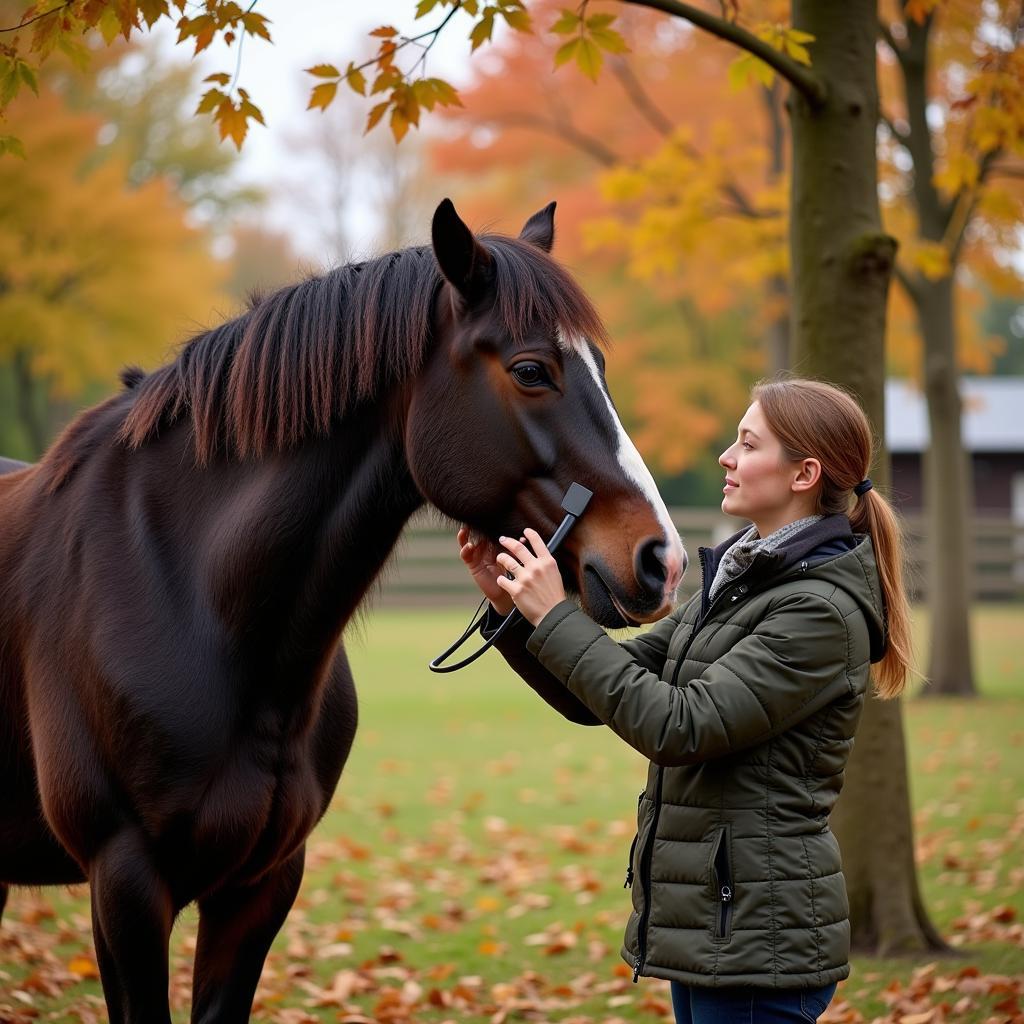Autumn brings a welcome change of pace after the heat of summer. For horse owners, Horses In Autumn means adjusting care routines to meet the unique challenges and opportunities of the season. From changing weather patterns to preparing for winter, understanding how to best support your horse’s health and well-being during this transitional period is crucial.
Preparing Your Horse for Cooler Weather
As temperatures begin to drop, horses in autumn start to grow their winter coats. This natural process helps insulate them against the coming cold. Regular grooming is essential to remove loose hair and prevent matting, which can trap moisture and lead to skin issues.  Horse being groomed in autumn
Horse being groomed in autumn
What about blankets? This is a common question amongst horse owners as the days get shorter. The need for a turnout blanket depends on your horse’s individual needs, climate, and coat thickness. Some horses with thick coats can tolerate colder temperatures without a blanket, while others, especially clipped horses or those with thinner coats, may benefit from added warmth. turnout blanket for horses discusses this topic in more detail.
Managing Your Horse’s Diet in Autumn
Horses in autumn often experience changes in their grazing habits as pastures begin to die back. Supplementing their diet with hay or haylage is important to maintain their nutritional needs. Adjusting the amount and type of grain can also help ensure they receive adequate calories and nutrients during this time.
“Autumn is a great time to reassess your horse’s overall health and nutritional needs,” says Dr. Emily Carter, Equine Nutritionist. “As grazing becomes less plentiful, ensuring they receive a balanced diet through supplementation is paramount for their well-being during the colder months.”
Addressing Common Autumn Health Concerns
Horses in autumn can be susceptible to certain health issues. Respiratory illnesses are more common as temperatures fluctuate, and mud can create ideal conditions for hoof problems like thrush. Regularly checking your horse’s hooves and maintaining dry, clean bedding can help prevent these issues.
What vaccines do horses need in the fall?
Vaccinations are another important aspect of autumn horse care. fall shots for horses provides valuable information on the recommended vaccinations for horses during this season. Protecting your horse against common equine diseases is crucial for maintaining their health throughout the year.
Enjoying Autumn Activities with Your Horse
Horses in autumn can still be ridden and enjoyed, even as the weather changes. Crisp autumn air and colorful foliage provide a beautiful backdrop for trail rides.
Remember to adjust your riding routine based on the weather conditions and your horse’s comfort level. Shorter rides or indoor arena work might be more suitable on colder or wetter days.
“Don’t let the cooler weather deter you from spending quality time with your horse,” advises John Miller, Certified Horsemanship Instructor. “Autumn offers unique opportunities for bonding and enjoying the outdoors together, as long as you take the necessary precautions.”
Preparing for Winter
Autumn is also the time to start thinking about winter preparations. Ensure your barn is properly insulated and stocked with adequate bedding. Having a plan in place for winter feeding, watering, and blanketing will help ensure a smooth transition into the colder months. Perhaps you are thinking about adding some fall festivities to your barn? Check out horses and pumpkins and do horses like pumpkin for some fun ideas. If you’re in the New York area, consider attending the autumn in ny horse show.
Horses in autumn require specific care to ensure their health and happiness. By following these guidelines, you can help your equine companion thrive during this beautiful but transitional season, setting the stage for a comfortable and healthy winter.
FAQ
- Do horses need different feed in autumn?
- How often should I groom my horse in the fall?
- What are the signs of respiratory illness in horses?
- When should I start blanketing my horse in autumn?
- What are some fun autumn activities to do with my horse?
- How can I prepare my barn for winter?
- What vaccinations are recommended for horses in the fall?
Contact Us
For further assistance, please contact us at Phone Number: 0772127271, Email: [email protected] Or visit our address: QGM2+WX2, Vị Trung, Vị Thuỷ, Hậu Giang, Việt Nam. We have a 24/7 customer support team.